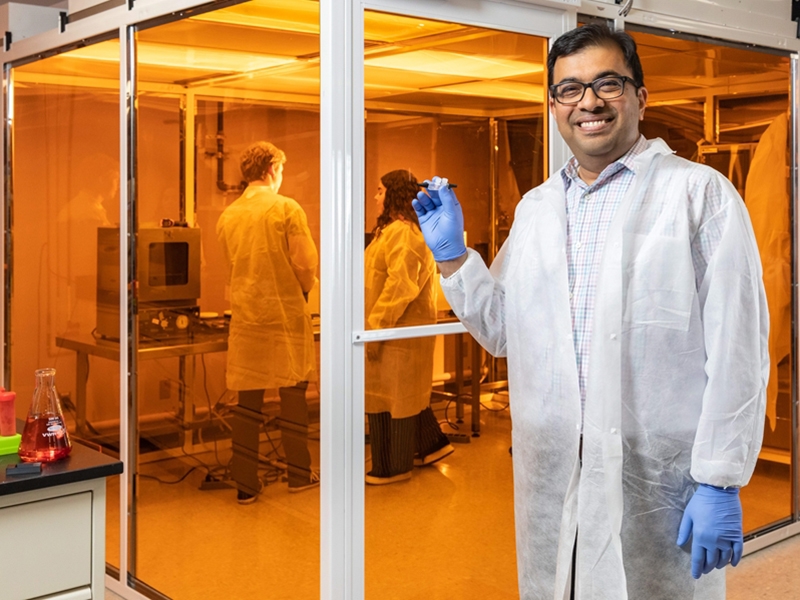Technology Ventures Inventors' Spotlight: Kartik Balachandran
Kartik Balchandran began as a mechanical engineer but transitioned into biomedical engineering in graduate school. "For most people who start as mechanical engineers," he explains, "they do it because they like building tools to solve problems. In biomedical engineering, I saw you could build tools to solve problems in health and healthcare. I saw that I could have a real and tangible impact on patients' lives, on the devices they use and on biomedical science in general."
Now Balachandran is a professor of biomedical engineering at the U of A who specializes in building microphysiological systems — 3D organ constructs engineered from human cells and tissues that mimic critical human functions. Informally referred to as "organs-on-chips" (or OOCs), these systems are measured in inches and can simulate the basic functions of the brain, heart, lungs or most any other organ with remarkable accuracy. For instance, the tissues of a nasal airway chip will actually produce mucus.
This work is done in The Mechanobiology and Soft Materials Laboratory, informally known as the Balalab, where Balachandran and his team study cell and tissue mechanobiology. Balachandran is interested in an organ's environment, not just its innate genetics, as well as the initiation and progression of disease, in hopes of using this knowledge to develop novel therapeutics. The study of cell function and disease in the context of mechanobiology is especially significant in organs and tissues that are in continuous dynamic motion during their function (such as the heart, heart valves, blood vessels and bone).
In essence, OOCs greatly reduce the need for animal testing by proceeding directly to human testing — without the ethical concerns of harming living, breathing humans. Experiments can be run quickly and cheaply, compared to clinical trials, so dead ends are discovered and abandoned much faster. In short, the system is designed to fail fast and cheap, accelerating the long journey to a successful therapeutic or basic scientific advance.
Balachandrans team is currently focused on three OOCs: one that models the nasal airway, one that models the heart and heart valves, and one that models the blood-brain barrier.
His goal is to create base platforms of these organs that can be used in industry and academic research as the starting point for the study of a range of diseases, injuries or any other "insults" that can impact organ health. With a basic platform, for instance, the Air Force would be able to use blood brain-barrier chips to conduct a comprehensive study of traumatic brain injury and the role the blood-brain barrier plays in it. Or nasal airway chips can be used to study a range of pollutants and infectious diseases impacting the upper respiratory system.
Looking to the future, Balachandran hopes to someday integrate these various chips into a full body platform in which "the brain can talk to the heart in some meaningful way." He also wonders if, "we can design systems independently that can function together with biochemical communication on a cellular level. That's the next big leap."
What keeps Balachandran pushing ahead after more than a decade? "Apart from developing actual technologies or any breakthroughs," he explains, "the main thing is working with students and trainees — just trying to develop their skills and inculcate a passion for this field so they can move it forward in any way they can. That's something that keeps me motivated and excited."
Topics
Contacts
Hardin Young, assistant director of research communications
University Relations
479-595-9393,
hyoung@uark.edu
Headlines
PetSmart CEO J.K. Symancyk to Speak at Walton College Commencement
J.K. Symancyk is an alumnus of the Sam M. Walton College of Business and serves on the Dean’s Executive Advisory Board.
Faulkner Center, Arkansas PBS Partner to Screen Documentary 'Gospel'
The Faulkner Performing Arts Center will host a screening of Gospel, a documentary exploring the origin of Black spirituality through sermon and song, in partnership with Arkansas PBS at 7:30 p.m. Thursday, May 2.
UAPD Officers Mills and Edwards Honored With New Roles
Veterans of the U of A Police Department, Matt Mills has been promoted to assistant chief, and Crandall Edwards has been promoted to administrative captain.
Community Design Center's Greenway Urbanism Project Wins LIV Hospitality Design Award
"Greenway Urbanism" is one of six urban strategies proposed under the Framework Plan for Cherokee Village, a project that received funding through an Our Town grant from the National Endowment for the Arts.
Spring Bike Drive Refurbishes Old Bikes for New Students
All donated bikes will be given to Pedal It Forward, a local nonprofit that will refurbish your bike and return it to the U of A campus to be gifted to a student in need. Hundreds of students have already benefited.





